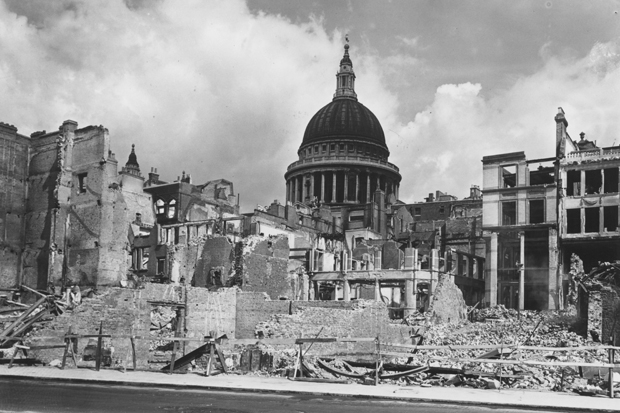If the early Martin Amis is instantly recognisable by way of its idiosyncratic slang (‘rug-rethink’, ‘going tonto’ etc) then the later Pat Barker can be similarly identified by its finely wrought accounts of physical trauma. ‘Afterwards, it was the horses she remembered,’ runs a specimen sentence from the new novel, ‘galloping towards them out of the orange-streaked darkness, their manes and tails on fire.’
Noonday’s Blitz-era setting — the horses are in flight from a bombed-out brewery — gives Barker ample opportunity to do what she does best: intent descriptions of splayed limbs that are sometimes engaged in the act of love, occasionally the subjects of paintings or, more often, casualties of war. Concluding the trilogy that began with Life Class (2007), it finds its three remaining protagonists — the artists Elinor and Paul and their old friend Kit Neville — in nervy middle-age, driving ambulances and bearing stretchers in a part of central London where the death toll is at its heaviest.
While the ghosts of previous instalments continue to gibber and fret (Elinor, in particular, is fixated on her at one point incestuous relationship with her dead brother Toby), the motto here, in a world where the prospect of extinction lies around every corner, is carpe diem. Nothing else, surely, can explain Paul’s fling with the obliging Sandra, prior to her departure into the Wrens, or Elinor’s passade with Neville, in which yet more bygone spectres are briefly re-animated.
All this leaves the novel delicately poised, halfway between an endlessly reconstituted past and a shrapnel-strewn present where tragedy and banality go hand in hand. ‘My daughter’s that age,’ Neville remarks, as the body of a six-year-old girl is brought out of a ruined house, ‘the sort of remark you might make outside the school gates.’ Pulling it forward, on the other hand, are two supporting characters — Kenny, the East End evacuee foisted upon Elinor’s sister and presumed dead in a bombed basement, and Bertha the outsize medium who terrifies Paul by claiming to ‘see’ the boy standing alongside him in Russell Square.
Although Noonday ends with most of its emotional issues resolved, the plot carries a faint whiff of desultoriness. Its conspicuous merits lie in scene, incident and painterly gloss — a disrupted séance, cigarette smoke at a meeting ‘settling into new patterns… like the marbled endpapers of books’.






Comments